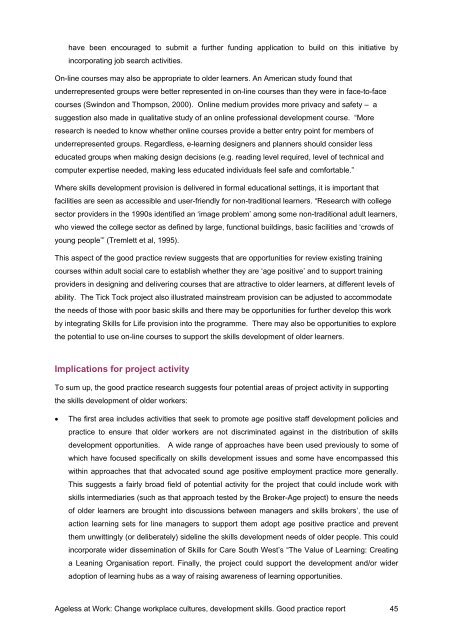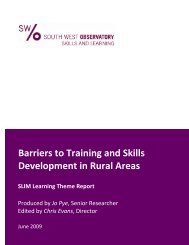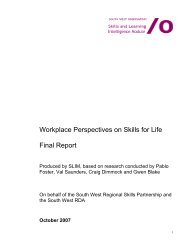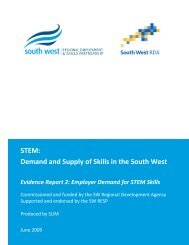Ageless at Work - Skills for Care
Ageless at Work - Skills for Care
Ageless at Work - Skills for Care
Create successful ePaper yourself
Turn your PDF publications into a flip-book with our unique Google optimized e-Paper software.
have been encouraged to submit a further funding applic<strong>at</strong>ion to build on this initi<strong>at</strong>ive by<br />
incorpor<strong>at</strong>ing job search activities.<br />
On-line courses may also be appropri<strong>at</strong>e to older learners. An American study found th<strong>at</strong><br />
underrepresented groups were better represented in on-line courses than they were in face-to-face<br />
courses (Swindon and Thompson, 2000). Online medium provides more privacy and safety – a<br />
suggestion also made in qualit<strong>at</strong>ive study of an online professional development course. “More<br />
research is needed to know whether online courses provide a better entry point <strong>for</strong> members of<br />
underrepresented groups. Regardless, e-learning designers and planners should consider less<br />
educ<strong>at</strong>ed groups when making design decisions (e.g. reading level required, level of technical and<br />
computer expertise needed, making less educ<strong>at</strong>ed individuals feel safe and com<strong>for</strong>table.”<br />
Where skills development provision is delivered in <strong>for</strong>mal educ<strong>at</strong>ional settings, it is important th<strong>at</strong><br />
facilities are seen as accessible and user-friendly <strong>for</strong> non-traditional learners. “Research with college<br />
sector providers in the 1990s identified an ‘image problem’ among some non-traditional adult learners,<br />
who viewed the college sector as defined by large, functional buildings, basic facilities and ‘crowds of<br />
young people’” (Tremlett et al, 1995).<br />
This aspect of the good practice review suggests th<strong>at</strong> are opportunities <strong>for</strong> review existing training<br />
courses within adult social care to establish whether they are ‘age positive’ and to support training<br />
providers in designing and delivering courses th<strong>at</strong> are <strong>at</strong>tractive to older learners, <strong>at</strong> different levels of<br />
ability. The Tick Tock project also illustr<strong>at</strong>ed mainstream provision can be adjusted to accommod<strong>at</strong>e<br />
the needs of those with poor basic skills and there may be opportunities <strong>for</strong> further develop this work<br />
by integr<strong>at</strong>ing <strong>Skills</strong> <strong>for</strong> Life provision into the programme. There may also be opportunities to explore<br />
the potential to use on-line courses to support the skills development of older learners.<br />
Implic<strong>at</strong>ions <strong>for</strong> project activity<br />
To sum up, the good practice research suggests four potential areas of project activity in supporting<br />
the skills development of older workers:<br />
<br />
The first area includes activities th<strong>at</strong> seek to promote age positive staff development policies and<br />
practice to ensure th<strong>at</strong> older workers are not discrimin<strong>at</strong>ed against in the distribution of skills<br />
development opportunities. A wide range of approaches have been used previously to some of<br />
which have focused specifically on skills development issues and some have encompassed this<br />
within approaches th<strong>at</strong> th<strong>at</strong> advoc<strong>at</strong>ed sound age positive employment practice more generally.<br />
This suggests a fairly broad field of potential activity <strong>for</strong> the project th<strong>at</strong> could include work with<br />
skills intermediaries (such as th<strong>at</strong> approach tested by the Broker-Age project) to ensure the needs<br />
of older learners are brought into discussions between managers and skills brokers’, the use of<br />
action learning sets <strong>for</strong> line managers to support them adopt age positive practice and prevent<br />
them unwittingly (or deliber<strong>at</strong>ely) sideline the skills development needs of older people. This could<br />
incorpor<strong>at</strong>e wider dissemin<strong>at</strong>ion of <strong>Skills</strong> <strong>for</strong> <strong>Care</strong> South West’s “The Value of Learning: Cre<strong>at</strong>ing<br />
a Leaning Organis<strong>at</strong>ion report. Finally, the project could support the development and/or wider<br />
adoption of learning hubs as a way of raising awareness of learning opportunities.<br />
<strong>Ageless</strong> <strong>at</strong> <strong>Work</strong>: Change workplace cultures, development skills. Good practice report 45








